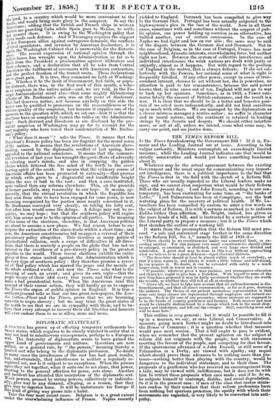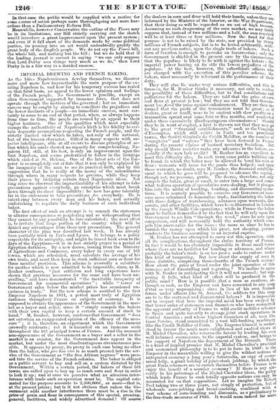THE TIMES REFORM BILL.
Is the Times foreshadowing the Government Bill ? If it is, Ru- mour and the Leading Journal are at issue. According to the vulgar authority, Ministers contemplate an exceedingly limited measure; while the Leading Journal indicates one that would be strictly conservative and would yet have something handsome about it.
Whatever may be the actual agreement between the existing Government and the usual organ for communicating very import- ant intelligence, there is a political importance in the fact that the Times is first in the field with the sketch of a Reform Bill. Those who are usually regarded as the Liberal leaders make no sign, and we cannot even conjecture what would be their Reform Bill at the present day. Lord John Russell, according to our con- temporary, has been rusticating for some time on "the banks of Lethe.' Lord Palmerston has been at Compiegne, not the best watering place for the recovery of political health. If Mr. La- bouchere has been compelled by custom to utter a few words on the subject of Reform it is with a coyness so marked as to indicate dislike rather than affection. Mi. Bright, indeed, has given us the mere heads of a bill, and is instructed by a certain portion of the Liberal party to prepare a measure ; but it is the Times which first sketches the outline of a working bill.
It starts from the presumption that the Reform Bill must pro- ceed "a safe and convenient stage further in the same direction as the Reform Bill, No. 1," namely the Bill of 1831-2—
" There should be no constituencies under one numerical limit, or ex- ceeding another. For this purpose very small constituencies should either be enlarged, or associated, or abolished, and very large ones divided and subdivided. A great deal may be done in this way without approaching what we believe to be a great delusion—equal electoral districts. "The franchise should at least be placed within reach of everybody, so that if a man wants it, and thinks it worth a little labour and self-denial, he can acquire it. No doubt, it can be extended with safety to a much larger class, both in towns and in counties. If possible, whatever gives a man position, and presupposes education and character, ought to give him a franchise. With regard to some of the new franchises proposed it may be fairly questioned whether they are worth the trouble, or whether they will tell at all at elections. "Above all, we have to take into account that all enfranchisement is dis- franchisement, and that all direct representation, as far as it goes, destroya the indirect. The theory of our present anomalous representation is that some very large classes are represented through employers and natural su- periors. Such is the case of our peasantry, whose interests are supposed to be in the hands of country gentlemen and farmers. Both masters and men would be virtually disfranchised by a change which took in the small shop- keeper and tradesman, and left out the cottager. Still, something must and will be done here."
This outline is very general ; but it would be possible to fill it up in a manner, we say, at once Liberal and Conservative. A measure going much further might no doubt be introduced into the House of Commons ; it is a question whether that measure would pass next session. That a bill ought to pass is evident, when we remember that the present agitation on the subject of reform did not originate with the people, but with statesmen courting the favour of the people, and competing for that favour. If the spontaneous advances of a John Russell, or still more of a Palmerston or a Derby, are viewed with apathy, any sequel which should prove those advances to be nothing more than pre- tence—nothing better than playing with the country, would be dangerous to the individual statesmen, and to their class. The proposals of a gentleman who has received no encouragement from a lady, may be viewed with indifference, but it does not he with him to retract those proposals when once made ; and if he do so, he subjects himself to contempt, dislike, and social degradation. So it is in the present case : if men of the claim that makes minis- ters confess by their conduct that their reform professions have been nothing but spnrionspretences, the apathy with which their
i movements are regarded, s very likely to be converted into anti- pathy.
IA that ease the public would be supplied with a motive for some canna of action perhaps more thoroughgoing and more haz- ardous than a Parliamentary Reform Bill. • Meanwhile, however. Conservative the outline of the Times may be in its limitation; any Bill strictly carryine-° out the sketch would introduce a, great improvement upon the present system ; and even if, it fall short of the demands made by some political parties, its passing, into an act would undoubtedly gratify the great ody of the English people. We do not cry the Times bill, the whole bill, and nothing but the bill ; but we do hold that if. the leading. journal is correct in saying "we can only su that Lord: Derby sees things very. much as we do," then rd Derby is in a fair way to a decided suocess.



























 Previous page
Previous page